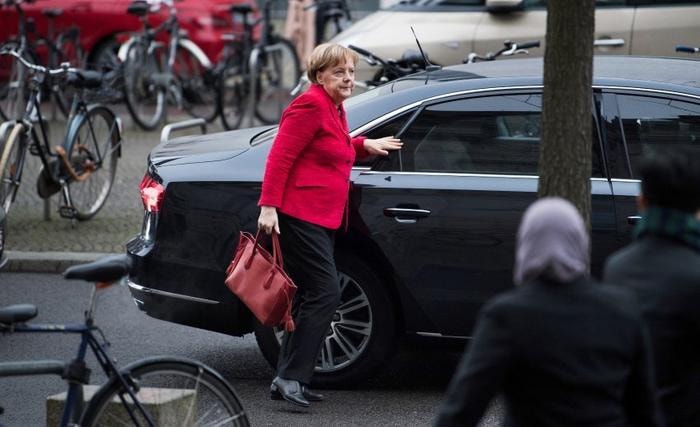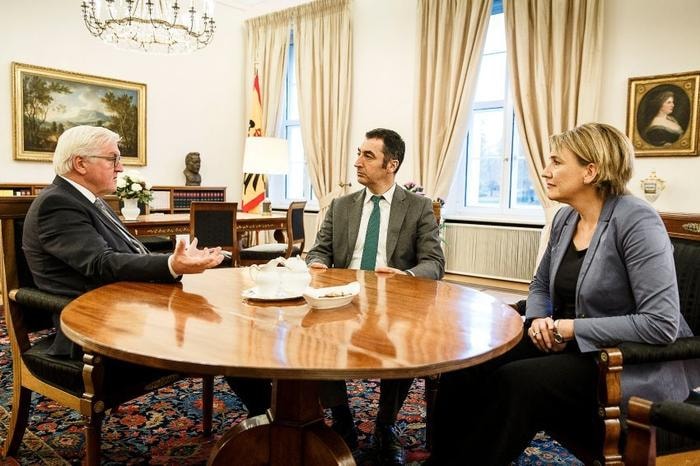Europe holds its breath waiting for the outcome of German politics
(Baonghean) - The agreement of the leaders of the German Social Democratic Party (SPD) to start negotiations with German Chancellor Angela Merkel on the possibility of forming a coalition government has made the public breathe a sigh of relief. A political crisis may have been 'defused', although there are still many difficulties ahead.
 |
| German Chancellor Angela Merkel is in a precarious position without a majority in Parliament and negotiations have failed. (DPA) |
"Lifebuoy" for Chancellor Merkel
Germany and possibly the whole of Europe lived in suspense and anxiety last week after negotiations to form a coalition government failed. The Free Democratic Party (FDP) withdrew from negotiations with Chancellor Merkel's Christian Democratic Union/Christian Social Union (CDU/CSU) and the Green Party.
The reason for the FDP's withdrawal from the negotiations, according to party chairman Christian Lindner, was that "it is better not to lead than to lead poorly" and that the negotiations failed because the parties could not find a common ground.
The two main issues that have caused the biggest obstacles for the parties, especially between the Greens and the Christian Social Union (CSU), to find consensus are immigration and the environment.
Specifically, the Green Party wants to abolish two provisions, one is the ceiling of accepting only 200,000 refugees per year and the other is the ban related to family reunification for immigrants with only 1-year residence permits.
However, the CSU - the traditional coalition of Ms. Merkel's Christian Democrats (CDU), strongly opposes both proposals due to concerns that if it makes concessions on the immigration issue, it will lose voters.
This failed negotiation is a bad situation for German politics because it leads to the possibility of the formation of a minority government led by the conservative Christian Democratic Union/Christian Social Union (CDU/CSU) party of Chancellor Angela Merkel.
Another possibility is to hold a new general election despite the recent one in September. Both scenarios are unprecedented in Germany, a country known for its political stability, which has had only eight chancellors in the seven decades since World War II.
In any case, Chancellor Angela Merkel still has the initiative to form a government. However, the delay in announcing the composition of the new coalition government has a negative impact on the psychology of the German people, as well as the European Union - where Berlin is the 'locomotive' leading.
In the worst case scenario, that is, re-election, many risks will threaten German politics. The worst possibility is that the far-right Alternative for Germany (AfD) party may continue to 'attack' German politics, as they won seats in the German Parliament in the election last September.
Therefore, the SPD's return to the negotiating table to seek a possible coalition is a decisive step to avoid a breakdown in German internal politics.
Continue the difficult journey
The SPD's agreement to enter coalition talks with German Chancellor Angela Merkel was not a simple decision. It comes with the condition that party members will have the final say on any deal.
This implies that the SPD has 'bargained' with other partners in coalition negotiations that it will have more decision-making power.
SPD Chairman Martin Schulz called his party's move based on a high sense of responsibility towards Germany in particular and Europe in general after Chancellor Merkel failed in her efforts to negotiate a new coalition government with two smaller parties.
 |
| German President Frank-Walter Steinmeier is playing his part by meeting with leaders of all the country's political parties to try to resolve the dispute. He met with Green Party co-leader Cem Özdemir. (Spiegel) |
The party's support for a new government could take the form of a coalition or a formal agreement that would not preclude a minority government under Merkel, Mr Schulz said.
Everything is likely to be decided at the meeting on November 30, where the Chairman of the Christian Democratic Union (CDU), current Chancellor Merkel; Chairman of the Christian Social Union (CSU) Horst Seehofer and Chairman of the German Social Democratic Party (SPD) Schulz will discuss the possibility of making concessions to form a coalition.
The decision to hold this trilateral meeting was the result of an eight-hour meeting between President Frank-Walter Steinmeier and SPD Party Chairman Martin Schulz.
Now, the first thing the partners must do is convince the SPD to change its stance, wanting to become a strong opposition party to Chancellor Merkel's coalition. Previously, SPD leader Martin Schulz said he would make this commitment after losing to the conservative CDU/CSU coalition in the general election on September 24.
The SPD suffered a crushing defeat, with its approval rating at its lowest since 1949. Mr Schulz has insisted that the SPD not be included in coalition talks. He recently reiterated this stance, saying his party is "not afraid" of new elections.
In theory, the SPD would still be in charge of the federal government, and the CDU/CSU-SPD coalition would have a majority in the Bundestag. However, given what Mr. Schulz has presented after the recent general election, the chances of success in negotiations are slim, and the conditions would be very strict.
In case the 'love affair' with the SPD fails, the CDU/CSU can still form a coalition with the Green Party to form a minority government. Then Ms. Merkel can keep her position as Federal Chancellor.
The leader of a minority government must be elected by MPs and if Ms Merkel wins a majority of votes she can remain Chancellor. However, this is a very precarious option and the female politician herself does not want her political fate to fall into that situation.
Therefore, the stable future of German politics and possibly Europe as a whole will likely be decided at the meeting on November 30 in Berlin./.
Thanh Son
| RELATED NEWS |
|---|

